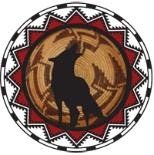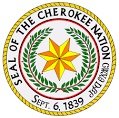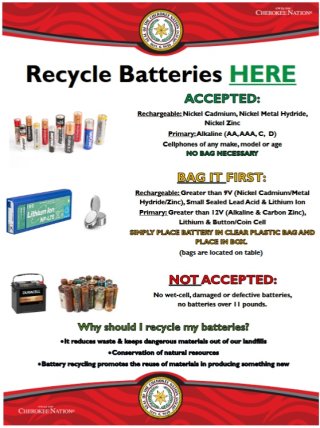Tribes Training Tribes on Sustainable Waste Management Programs: Coyote Valley Band of Pomo Indians and Cherokee Nation
On this page:
Matched Tribes
Coyote Valley Band of Pomo Indians (Mentee)

The Coyote Valley Band of Pomo Indians are situated in Redwood Valley in Mendocino, California. With only a few employees on staff, Christina Lara, Coyote Valley Band of Pomo Indians Environmental Specialist, requested technical assistance on building a solid waste and recycling program, as well as developing complaint forms, code regulations, and littering and illegal dumping protocols. In 2022, under EPA’s National Tribal Waste Management Peer Matching Program, the Coyote Valley Band of Pomo Indians matched with the Cherokee Nation.
Cherokee Nation (Mentor)

The Cherokee Nation, the largest of three Cherokee federally recognized Tribes, also experienced past problems with littering, recycling, and illegal dumping. To remedy these issues, Cherokee Nation has a large environmental media program, recycling initiatives, and complaint database to report illegal dumping. Because of the successes and knowledge gained in developing their own waste management initiatives, Jason White, Cherokee Nation Environmental Director, and Chelsea Jones, Cherokee Nation Environmental Specialist IV, previously mentored to other Tribal communities through the National Tribal Waste Management Peer Matching Program on a variety of issues.
Sharing Resources to Improve Community Knowledge and Awareness
In March 2022, Jason White (Cherokee Nation), Chelsea Jones (Cherokee Nation), and Christina Lara (Coyote Valley Band of Pomo) met to discuss Coyote Valley Band of Pomo’s needs for technical assistance. The Coyote Valley Band of Pomo Indians Tribe was starting fresh with their waste management program. Previous initiatives were unsuccessful largely because of limited capacity to monitor activities. The Coyote Valley Band of Pomo Indians faced growing challenges with littering, recycling, and illegal dumping. With no formal programs in place to address these challenges, the Coyote Valley Band of Pomo Indians sought technical assistance to establish a recycling collection center. The Cherokee Nation had extensive knowledge and experience to offer effective strategies for launching a waste management program.
The Cherokee Nation has recycling initiatives in place that are only open for Tribal employees. Currently, the focus is recycling cardboard and paper, but the Tribe is looking to expand recycling. CNEP also has recycling initiatives for electronic waste, which are easy to run and cost-effective. Using an EPA Indian General Assistance Program grant, the CNEP partnered with the city to do street clean-ups. Jason and Chelsea encouraged Coyote Band of Pomo Indians to hold similar events a couple times a year for their community, partnering with the nearby city, so they can dispose of the trash collected.
CNEP shared resources and example for Coyote Band of Pomo Indians to develop a recycling fact sheet that would include information for Tribal members about where to go to recycle materials like electronic and hazardous waste as well as other waste management best practices. For their fact sheets, CNEP included information such as, “Best Buy will scrub your computers and recycle them,” and “Walmart recycles plastic bags.” This gives people ideas for where they can take their waste. Jason and Chelsea also suggested holding a battery recycling event, noting that the CNEP works with a company to collect batteries in boxes, and then the company recycles the batteries.
CNEP shared links to several resources, including a link to a Google drive folder with fact sheets, flyers, an environmental complaint form, a hazardous waste overview from an event meant to raise community awareness, and details on other waste management and recycling initiatives for Coyote Valley Band of Pomo Indians to use for their own waste management initiatives.
CONTACTS
Kim Katonica, Co-Team Leader
EPA Office of Resource Conservation and Recovery
Federal, State and Tribal Programs Branch
Tribal Program Team
katonica.kim@epa.gov
(202) 566-0467
Jason White, Environmental Director
Cherokee Nation Environmental Programs
Jason-White@Cherokee.org
(918) 453-5110
Chelsea Jones, Environmental Specialist IV
Cherokee Nation Environmental Programs
Chelsea-jones@cherokee.org
(918) 453-5768
Christina Lara, Environmental Specialist
Coyote Valley Band of Pomo Indians
epdes2@coyotevalley-nsn.gov
(707) 485-8723 x 2261


